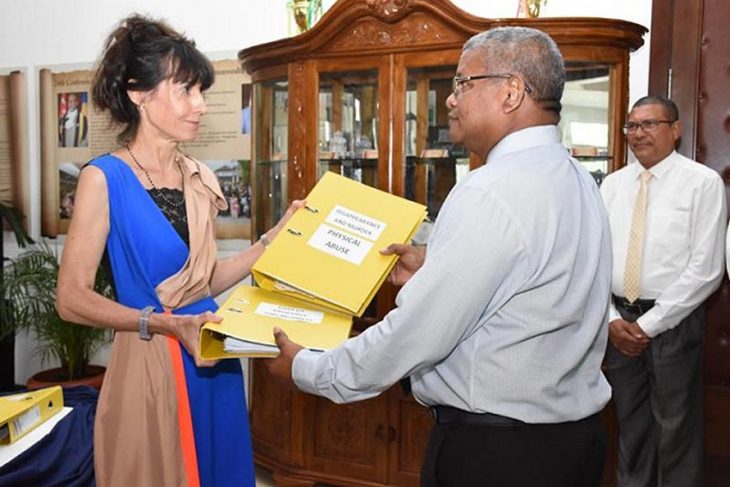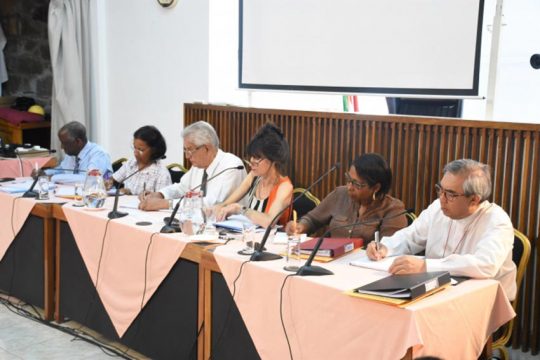JUSTICEINFO.NET: So far, what has been the biggest hurdle the TRNUC has faced?
GABRIELLE LOUISE MCINTYRE: It is difficult to identify the biggest hurdle so far. One hurdle is of course the passage of time, because of which people don’t remember or claim not to remember the events alleged. Another hurdle is keeping on top of the number of complaints that are being heard simultaneously, around 130 currently, and recalling the evidence that has already been given in relation to a case. We cannot refresh our memories in an efficient manner because we have a backlog in the transcription of the hearings. Where that record is in Creole, it has to be translated into English, the working language of the Commission, which creates further delays. But even scheduling the hearings involves overcoming hurdles, particularly in relation to locating witnesses, either in the Seychelles or abroad, so that we can serve them with a request to appear.
Based on some testimonies, there has been a lack of material evidence or access to it for the TRNUC. Does this affect the Commission's work?
A lack of evidence makes it difficult to make a determination and the Commissioners have to decide what the unavailability of evidence signifies in any particular case.
Does that mean that you've been unable to establish the facts in some cases?
The Commission has to try and find that evidence through other sources. For example, the lack of availability of police records has led the Commission to seek evidence from members of the police force at the time of the alleged complaint and obtain evidence directly from them. This method has been used in relation to the disappearances of Gilbert Morgan and Hassan Ali and is being used in relation to numerous other cases.
The Commission is not seeking to punish or alienate perpetrators. It is trying to bring them into a process of reconciliation”
In the past months we’ve often had the impression that the Commission has a hard time reaching conclusive findings; you hear evidence from victims but rarely get decisive and helpful evidence from former alleged perpetrators, or state authorities…
The Commission will reach conclusive findings on a case when it has exhausted its investigations. At this point in its proceedings it has not sought to make conclusive findings because it is still assessing the evidence. Most persons accused of the perpetration of gross violations of human rights before the Commission are served first with a suspect notification and the right to make a written response to that notification. The Commission has not yet reached the stage in its proceedings when those against whom credible allegations have been made and who have been given the right to answer in writing will be called to testify. It needs to build its evidentiary basis prior to calling these people to testify. It is not seeking to punish or alienate perpetrators. It is trying to bring them into a process of reconciliation and give them the opportunity to explain the context in which they carried out human right violations, to seek forgiveness from the complainants but also from society.
The Commissioners are aware that people are not telling them the whole truth”
Some feel that the commissioners do not push hard enough for answers…
The Commissioners do not believe a combative attitude towards witnesses is conducive to building a collective spirit focused on reconciliation. The Commission is seeking to build trust with the community and confidence in all persons that it will accord them a fair process. The Commissioners are aware that people are not telling them the whole truth, but it is also confident that as the process continues people that have been reluctant to be forthcoming will be more likely to do so. Indeed, it already has examples of witnesses coming forward and telling the Commission half of what they know and a few days later advising that they wish to come back because they have more information. Reconciliation is about cooperation, you can’t force reconciliation on people, and the Commission is seeking cooperative relationships with complainants, witnesses, suspects and perpetrators. It has to be underscored that the Commission is not a court, it is not judging people, it is seeking to bridge divisions between people.
With regard to investigations, concerns have been raised too. Do you have a strong team?
Investigations are led by the Commissioners with the support of five investigators. Resources are extremely limited and only one of our investigators has any previous experience in investigative activities. In relation to each case we gather as much documentary and other information as we can, locate important witnesses, request written responses, send out suspect notifications etc. Once we have exhausted investigative efforts and as soon as we have all the relevant transcripts in relation to the evidence heard in a case, we will make determinations.
February was the deadline to file complaints – how many have been lodged?
We had 426 cases as of 9 February 2020, but a few have been withdrawn and some have been ruled inadmissible as they do not allege a human rights violation or a connection to the coup d’état of 1977. I would say we have approximately 420 cases, but admissibility decisions remain outstanding on approximately 200 of these cases. In most of the outstanding cases we need further information from the complainant.
Will the Commission achieve its mandate in 3 years?
There is no doubt that it will be challenging and that we do need more resources, but we are committed to doing all within our power to complete our mandate in that time frame. For a small country like Seychelles it is important that a process such as this not be allowed to linger and drag on. Its effectiveness will be reduced by long delays and its ability to meet its objectives seriously undermined.
Interview by Patsy Athanase, our correspondent in The Seychelles
SEYCHELLES' TRUTH COMMISSION
Set up in May 2019, the Seychelles’ truth commission is listening to complaints on human rights violations in the island nation following the June 5, 1977 coup d’état, led by the then Prime Minister France-Albert René. René, who died in February last year, established a one-party state and was the president between 1977 and 2004. Multi-party democracy was re-instituted in 1993. The Commission’s mandate is to shed lights on events leading up to the coup and its aftermath until the return to a multi-party system. Its sessions are held over a ten-day period, every month, since September 2019, and are broadcast live on national TV and streamed online. The Commission has seven members, including two foreigners who are non-resident in Seychelles, of whom the president Gabrielle Louise McIntyre, from Australia. The Commission is planned to work for three years.






